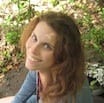
WITS Voices: Imagination in a Post-Election Classroom
April 3, 2017
By Corinne Manning, WITS Writer-in-Residence
The day after the election, I carried a tote-bag full of ferns, poetry by June Jordan, and a memoir in comics by Lynda Barry into the high school. To my students, I tried to introduce the idea of imagination, of finding ways to tap into their sensory experiences, even when the notion of finding the body feels impossible—or even when the government continues to legislate as if you don’t exist, or reinforces that you aren’t possible. My students tickled the ferns against their skin, rubbed them between their hands, and pressed the leaves to their faces. That day, I heard about students all over the country being told to not protest or walk out of school. I overheard adults say, “What’s the point?” That the most vulnerable communities “won’t get it so bad here in Seattle.”
The best part of that day was that the room smelled like earth, thanks to all those ferns.
Since the election, I’ve been thinking a lot about the imagination: how to have my own, how to help students access their own during a time when what’s happening both actively and potentially is overwhelming, even for those who have been activists for decades. I’m not sure how someone sits in a school all day, not talking about the only thing there is to talk about—especially those students whose lives have been directly threatened even by previous administrations, who’ve been shown that they don’t matter, that they are impossible, their own existence in question.
I’m a gender nonconforming person, and I’m writing this just days after Trump removes protections to transgender students, including bathroom protection. What does it mean to access your imagination when you are a teenager who is trans, who is undocumented, who is Muslim? When you are Native and the injustice at Standing Rock is something that needs to be debated on both sides in the classroom? When it is a radical act for a classroom teacher to wear a shirt that says that your life matters, Black Lives Matter, to work?
When I think about people in authority telling students not to protest, I think about lack of imagination.
I think about the John Berger essay, The Nature of Mass Demonstrations: “The truth is that mass demonstrations are rehearsals for revolution: not strategic or even tactical ones, but rehearsals of revolutionary awareness.” As a teaching artist, there is a limit to what I can offer students. It’s not my classroom. I can offer support while I’m there, but then I’m gone. If a student writes something particularly vulnerable I’m not there, it’s up to the next class to support them.
There are students I’m thinking of right now as the current administration makes continual cuts against people without considering the effect that those decisions can have on real, lived lives. I have to admit that there is something sad to me that we continue to talk about the bathroom in regards to trans rights, that we might even consider Obama’s bathroom protection to be a radical act. If you are holding your pee all day just to avoid going to the bathroom, I’m not sure what opportunity there is to imagine. I am trying to figure out how to have an imagination so big that as an instructor I can create a space where students can have room and security to stretch their own.
Walidah Imarisha, editor of Octavia’s Brood: Visionary Fiction for Social Justice Movements coined the term visionary fiction “to encompass the fantastical cross-genre creations that help us bring about” the world we want to see, not a world of lesser evils, but one of complete transformation. We’re talking something closer to utopia, which students often can only define in terms of its opposite, the beloved dystopian genre.
When I invite students to ask the question what if? and to write a story where an injustice is “solved,” where they see a world in which racism or gender discrimination doesn’t exist, the challenge is to help them think outside of reaction, outside of their response to present circumstances. They want to solve the problems of police brutality or bathroom access, and yet have trouble seeing the larger issue of white supremacy or state violence or hetero-patriarchy behind it. They imagine a world where everyone decides to become a cop, or a world where no one has bladders. When it’s not my classroom and I only have fifty minutes with them, how do I get my imagination to go beyond, so that theirs can, too?
But then again, my students are the ones continually demonstrating imagination—despite the floundering adults around them who have become convinced that there’s no point. Every day, these students go to school imagining outside of what they have been given. They are changing their names and pronouns, they are wearing their hair pinned as if half of it is shaved before finally shaving it off, they are not gendered as or using male pronouns, but they go and sit with a group of cis-boys who are going to perform a very masculine poem.
When we are writing together in that classroom, our imaginations are meeting, we are practicing imaginary awareness with others, even if fifty minutes is all we have. Even if the best we can come up with still smells like dirt.
 Corinne Manning received her MFA from UNC Wilmington. Her fiction and nonfiction have appeared in Story Quarterly, Vol 1 Brooklyn, Arts & Letters, Drunken Boat, The Oxford American and The Nervous Breakdown. Her story “Slow Steady Eruption” was published as a chapbook by Alice Blue Books in 2014. She’s received grants and fellowships from Artist Trust, Seattle Office of Arts & Culture and was the Hub City Writer’s Project Writer-in-Residence in 2010/2011. She co-coordinates The Furnace Reading Series, a long form prose reading series in Seattle.
Corinne Manning received her MFA from UNC Wilmington. Her fiction and nonfiction have appeared in Story Quarterly, Vol 1 Brooklyn, Arts & Letters, Drunken Boat, The Oxford American and The Nervous Breakdown. Her story “Slow Steady Eruption” was published as a chapbook by Alice Blue Books in 2014. She’s received grants and fellowships from Artist Trust, Seattle Office of Arts & Culture and was the Hub City Writer’s Project Writer-in-Residence in 2010/2011. She co-coordinates The Furnace Reading Series, a long form prose reading series in Seattle.